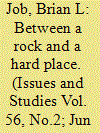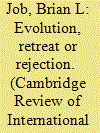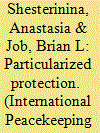|
|
|
Sort Order |
|
|
|
Items / Page
|
|
|
|
|
|
|
| Srl | Item |
| 1 |
ID:
173187


|
|
|
|
|
| Summary/Abstract |
“Middle powers,” variously defined, have served relevant and significant roles in the post-WWII regional and global orders, facilitated by structural conditions of “long peace” among great powers and proactive leadership by and among creative middle powers. Within the complex Asia-Pacific security order, “middle powers” such as Australia, Canada, and South Korea have had the “space” to engage the non-like minded and advance multilateralism with security guarantees from the US. However, Beijing and Washington today are eliminating this space and its associated choices for middle-power diplomacy by increasingly characterizing their rivalry as a confrontation of “existential threats” between incompatible “civilizations” and securitizing trade and technology. China and the US are each selectively ignoring or purposely eroding key aspects of a rules-based international order. This paper highlights the dilemmas of South Korea, Australia, and Canada, middle powers who have found themselves individually and collectively “stuck” facing contradictory global and regional policy choices.
|
|
|
|
|
|
|
|
|
|
|
|
|
|
|
|
| 2 |
ID:
151305


|
|
|
|
|
| Summary/Abstract |
This paper outlines the development and evolution of the normative positions of China, Brazil and India on issues surrounding the responsibility to protect (R2P) by charting their engagement in the ‘institutionalized conversation’ within the United Nations. In doing so, it seeks to dispel characterizations of these states as having adopted individual or common positions that either wholly reject or accept R2P. The nuances of the adaption and adoption of their postures need to be appreciated. Indeed, of the three component ‘pillars’ of R2P, they find themselves in general accord regarding Pillar One (state responsibility) and Pillar Two (prevention and assistance). It is on Pillar Three (reaction and response) that they diverge from each other and find themselves most at variance with ‘Western’ agendas of intervention and regime change. This divergence is most sharply drawn at present, in light of the Libyan and ongoing Syrian experiences.
|
|
|
|
|
|
|
|
|
|
|
|
|
|
|
|
| 3 |
ID:
143796


|
|
|
|
|
| Summary/Abstract |
The protection of civilians at risk in armed conflict has, since the late 1990s, become institutionalized at the United Nations (UN), gaining acceptance as a normative rationale for UN peacekeeping. However, the bulk of civilians in need of protection in armed conflict are unlikely to attain it. The article develops an argument on ‘particularized protection' – particularized in that UN Security Council (SC) mandates are formulated and adjusted over time to direct mission protection to specific subsets of civilian populations, that is, those relevant to the UN itself, the host state, other states, NGOs and the media, leaving most local civilians receiving little effective protection. Particularized protection, we argue, is a result of the institutional dynamics involving actors producing mandates – the UNSC – and those providing protection – peacekeeping missions – whereby mandates are specified to direct mission protection to selected, particularized groups. We demonstrate these dynamics in two cases, Côte d'Ivoire and Somalia.
|
|
|
|
|
|
|
|
|
|
|
|
|
|
|
|
|
|
|
|
|